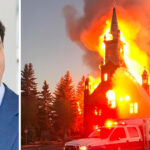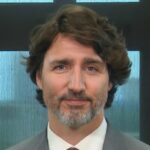Canadian Politics, Pride
How the Canadian media works with LGBT activists to demonize Christian communities
By Jonathon Van Maren
On June 8, Prime Minister Justin Trudeau hosted a flag-raising ceremony on Parliament Hill. Accompanied by other politicians, the LGBT banner was raised in front of Canada’s seat of government alongside the national flag, and Trudeau warned the assembly that the LGBT community was facing “a rise in anger, hatred and ignorance and intolerance,” citing the fact that some places have declined to fly the Pride flag. In Trudeau’s Canada, the government expects citizens to pledge allegiance to two flags rather than one, with anyone who disagrees being subject to demonization and relentless critical coverage from the taxpayer-funded media.
It is significant, however, that the vitriol aimed at those who still hold to the values most Canadians have shared for most of Canada’s 156-year history is concentrated almost exclusively on those of the Christian faith. The protests against “Pride Month” activities in schools in Ottawa and Calgary over the past month have been primarily led by Muslim parents, for example, but with the exception of the National Post, that inconvenient fact has been ignored entirely. Contrast that fact with the intense media coverage of churches—and one church in particular—in the small town of Norwich in southwestern Ontario, population 11,000.
On May 26, the Norwich town council voted to limit the range of flags flown on municipal property to the town, provincial, and federal flags for the purpose of unifying the population under banners that represent everyone. The motion was initially put forward in April by Councillor John Scholten and passed in a 3-2 vote with the support of Mayor Jim Palmer, with Councillor Adrian Couwenberg noting that the township wants “to stay politically, culturally and religiously neutral.” For the LGBT activists who addressed the council, that wasn’t good enough. (A separate motion to formally declare June to be “Pride Month” in the township was also voted down.)
The position of Oxford County Pride is that they have the human right to have their ideology celebrated on public property and endorsed by government. They have filed a human rights complaint against the township of Norwich and the three councillors who voted for the bylaw, seeking both a verbal and written apology from the politicians who disagreed with them, delivered in the council chambers, an elimination of the bylaw, and a rainbow crosswalk painted in downtown Norwich—along with $50,000 in “damages.” LGBT activists aren’t used to not getting their way, and thus those in Norwich who disagree with them have become a primary target of both LGBT activists and their allies in the press.
The media coverage of the last six weeks has been revealing. Journalists have been eager to frame a rather banal bylaw that simply states that only civic flags should fly on civic property as a “culture war” initiated by bigoted Norwich residents. Specifically, the press has decided to demonize churches. Headlines inform readers precisely how they are supposed to feel about this. Global News: “Church holds ‘influence’ over Ontario community that voted down Pride flags, locals say.” Another: “Inside Norwich, an Ontario town at war with a church ‘controlling’ its citizens.” The CBC: “A small town divided over the Pride flag.” In every story, the narrative is the same: A church whose membership makes up about a fifth of the population is somehow oppressing the other four fifths.
The stories are a toxic fusion of hearsay, anti-Christian bigotry, and misleading quotes, creating a narrative that the LGBT activists presumably hope will be helpful with their human rights complaint. The ignorance that pervades the coverage is also illustrative—Canada has been post-Christian for several generations now, and journalists appear genuinely shocked and outraged to discover that there are still people who hold the beliefs that Christians have held for 2,000 years (and that a majority of Canadians in many non-white immigrant communities still hold). Sunday shopping bans only disappeared a few decades ago, for example, but two Canadian journalists found it so strange that many stores in Norwich choose to close on Sunday that they began their stories with breathtaking descriptions that read like something out of a foreign correspondent’s report from a foreign and frightening land.
From Jessica Smith of The Canadian Press on May 10:
On a recent weekday afternoon, the main street in Norwich Township was bustling with people chatting at the local cafe, eating at the deli, or browsing through shops. But residents say all that changes on Sundays, when the community in southwestern Ontario largely closes for the Christian day of rest, clinging to a practice generally abandoned across the province since the early 1990s when the government scrapped mandatory Sunday closures. For locals, the Sunday quiet — and a recent controversial decision to ban Pride flags on municipal property — point to the outsized influence in Norwich of one church, the Netherlands Reformed Congregation.
From Ashleigh Stewart of Global News on June 22:
Every Sunday, the agricultural hamlet of Norwich, Ont., becomes a ghost town.
Almost all the town’s shops — including Foodland, Norwich’s only supermarket and its Shoppers Drug Mart — are shuttered. No one is mowing their lawn or dining out. The sports fields sit empty. On the desolate main street, a trickle of people stop to use an ATM while a group of women etch rainbows onto the sidewalk with chalk. They’re gone by the time the road swells with traffic at 11 a.m., when hundreds of cars stream out of the Netherlands Reformed Congregation’s (NRC) Sunday morning service and form a traffic jam about a kilometre long.
Residents say it’s this wealthy church that has created a bleed between theocratic rule and secular politics, currying political favour, shunning the LGBTQ2 community, and demanding recreation and businesses shutter on Sundays — even though Sunday shopping has been legal in the province for decades.
Later in her report, Stewart noted that a statement from Loblaw, which owns Shoppers Drug Mart, indicated that the pharmacy hadn’t been open on Sundays for forty years and observed that the “few business owners that do open on Sundays, such as Tito’s Pizza and Godfather’s, had had no issues from the NRC”—but doesn’t let the facts get in the way of a good narrative when she has a mythical theocracy to construct. Incidentally, no evidence is presented for the claim that there is a bleed between “theocratic rule and secular politics,” which would be a genuinely funny claim if the intent wasn’t so insidious. Stewart’s real implication is that Christians participating in democracy at all is “theocratic bleed.”
Global News notes that one of the five councillors attends the Netherlands Reformed denomination (I should note for full disclosure that article also mentions that I am a member of this denomination and quoted one of my columns on Pride Month), and this is cited as partial evidence that a single church is somehow pulling off a theocracy—something that isn’t claimed directly, but is strongly implied in order to demonize the members as fifth column oppressors. Stewart breathlessly notes: “Some even sent in petitions in support of the bylaw.” That line of “reporting” aligns with the deeply held progressive belief that democracy is only good if it produces their preferred result. To give you an idea of how ridiculous this claim is, the formal definition of theocracy is “government by divine guidance or by officials who are regarded as divinely guided.” This is an obvious attempt to make a religious community that wants to be left alone sound like the mullahs of Iran.
For example, Stewart writes: “It’s difficult to know if NRC’s perceived power over Norwich is a matter of urban legend, subtle suasion or something more nefarious.” With her perfunctory qualifier in place, she then ploughs forward to build a flimsy but polemically potent case for the “nefarious” category.
The alleged journalist then features a series of quotes from Norwich residents who clearly dislike the church in general and Christian beliefs in particular. Scott Takacs, who is described as a realtor “who lives in Norwich with his husband Chris,” is quoted as saying that Norwich is a “backwater spit hole” because it does not feature the LGBT flags that have become ubiquitous in other municipalities. (This is an odd way for a realtor to describe the community he works in.) Another resident told Global that the bylaw made her cry because “[m]y 10-year-old daughter is a lesbian.” But interestingly, the CBC reported that those they talked to “always felt welcome—until the last few years.” What is significant about the last few years? The church(es), as every story notes, have been here for over a half-century—some of them longer. The reason for escalating tension is that LGBT activist groups are making more and more demands—and these demands have created tension that did not previously exist.
Groups like Oxford Pride, by insisting that their flag fly from civic flagpoles, are not simply demanding tolerance—they are demanding celebration. Those are very different things—and the bylaw limiting the flags to universally inclusive symbols is a reasonable solution to the division for those acting in good faith. Indeed, we are seeing similar scenarios like this play out across the country—massive “Pride” sidewalks are painted prominently in downtown areas, and any objection is then promptly cited as evidence of “hate” where previously tension had not existed. LGBT events and curriculum are made mandatory in public schools, and when parents object they are painted as “bigots” who are “targeting” the very activists insisting that their ideology be taught to everyone’s children.
In several towns, the police are actually investigating tire marks on rainbow crosswalks—which are, incidentally, painted on the streets where vehicles with tires drive. You can’t make this stuff up.
These stories do cite examples of Pride flags being stolen as well as anonymous, hearsay accounts of people saying unspecified hateful things. It should go without saying that vandalism, theft, and genuinely hateful speech are wrong and sinful. Christianity teaches a much higher standard than tolerance for neighbours—it teaches that all must love their neighbours. It is indicative, however, that the opposition of some to LGBT flags on public property is characterized as bigotry, while the actions of LGBT activists targeting a place of worship are not. The Norwich NRC, for example, has had a Pride flag spraypainted on the back of the church. In common English, that is called “vandalism.” In Canadian legalese, that’s called “mischief” and is a criminal act (Section 430.1(1) of the Criminal Code).
Additionally, two topless women show up every Sunday morning in front of the church and flash their breasts at families with children arriving for morning services. This is framed not as activists targeting a religious group, but as legitimate protest. As Global put it:
Come Sunday, two topless women stand outside the NRC, draped in Pride flags, as churchgoers arrive for the morning service. Afterwards, they plaster fake snow clearing and garage sale signs around the town, adorned with Pride flags. It’s the only way they can get around the ban, they say. “We just want inclusivity,” says Jennifer St Pierre, wearing a rainbow-coloured tutu as she sticks a rainbow-coloured cross to a signpost. “The church can’t control us.”
Or as the Brantford Expositor reported:
So, as the conservative Christian denomination ended its morning service Sunday, Marta McDonald stood outside the property topless with a sign that read: “The shirt goes on when our flag goes up.”
“I figured that if I’m an irritant on an ongoing basis, they’ll hopefully ask council to reconsider the motion that was voted on,” said McDonald, who’s lived in Norwich for six years.
McDonald is openly admitting that she is harassing church-going families by exposing herself to them—including many children—for political ends. Yet, the coverage she has received for her indecent protests is either neutral or positive. If topless women were protesting a mosque, or a synagogue, or a temple, I suspect the reaction from the press would be markedly different. An adult weaponizing nudity against families with children for the self-confessed purpose of political harassment would not be accepted or lauded in any other circumstances. Only when utilized against Christians is it acceptable. Claims from LGBT activists that a previously peaceful community is now “unsafe” simply because the council decided to fly only offical flags are accepted as obviously true without question, and those premises are used to demonize an entire religious group. But the fact that children might feel unsafe when adults are targeting them with nudity is ignored entirely. Christians, as it turns out, are acceptable collateral damage. Despite the media characterizations of this harassment, as with mischief, it is a criminal act in Canada which prohibits the disruption of worship meetings (Section 176(2) of the Criminal Code).
Norwich is not the only jurisdiction to limit which flags can fly on municipal property—there are several others. Councillor Rhonda Jebenville in the Ontario municipality of Chatham-Kent put a motion forward in April which has since failed. Jubenville received a flood of hate, including two death threats, from LGBT supporters. “I’ve been called words that I had to look up,” Jubenville noted. She even had “a witch’s spell cast on me, all because I feel our three governmental flags are what is needed outside municipal centres. Why would I now, as a councillor, feel compelled to support some of these groups that wish me death and hate over a flag? This should concern all of council.” A handful of local outlets covered the story of a Canadian politician receiving death threats, while over forty stories have been published thus far about Norwich in almost every mainstream outlet in the country. The contrast clearly reveals the media bias and their commitment to a specific narrative.
The case study of the media and activists partnering to target a single church in a small community for their Christian beliefs to create a scapegoat for a town council decision they disagree with is a microcosmic example of how much of the Canadian press works. Most Canadian journalists—especially those covering these issues—are not engaging in journalism. They are engaging in advocacy on behalf of an ideological group whose premises they entirely share. Anyone who doubts that simply has to read through the stories they have written on behalf of the LGBT movement and to compare the coverage of LGBT activists with the coverage of those who disagree with them—even adults stripping down in front of kids receive praise, because they are doing so on behalf of a cause the media is also fighting for. Many other Canadian Christian institutions have received this treatment over the past decade, and many more will find themselves targeted before this decade is out.
To cite another example: You have probably never heard about the community service work done by staff and students at Trinity Western University. You probably have heard the stunning revelation that, as one media headline put it, it is a “university that forbids sex outside heterosexual marriage.” It is not news to culturally literate people that Christianity forbids sex outside of heterosexual marriage—but the Canadian press treats it as news for a specific reason. Progressive politicians and their media allies have put a lot of elbow grease into stereotyping conservative Christians, and it has been effective. Politicians and the press routinely ignore the immense amount of charitable and community work done by churches and the real economic impact to shutting down religious institutions. Instead, when churches are covered by the media, it is almost always a story about a conflict between Christianity and the sexual revolution.
There is a real cost to all of this. Religious Canadians, and Christians in particular, give more to even secular charities than non-religious people—and indeed, as the number of Canadians who hold Christian beliefs consistently shrinks, charitable giving has precipitously dipped, with the government having to make up the difference. But despite that, Global News noted last year that “[m]any Canadians now believe Catholicism, evangelical Christianity and Islam are more damaging to society than beneficial, a new survey shows, as people across the country continue to turn their backs on religion.” Why is that? Only a small fraction of Canadians actually practice (as opposed to just identify with) any form of Christianity, and so most Canadians are entirely ignorant of what Christians actually believe and what they actually do—except for what they read in the press.
When Prime Minister Justin Trudeau, the government-funded media, and the LGBT movement insist that Canadians—in order to be considered Canadian—must pledge their loyalty to two flags rather than one, they intentionally exclude and demonize millions of people from many religious groups who do not agree. The Canada they champion is one that would be unrecognizable to most Canadians for most of our history, and their bigotry should be both recognized and rejected.









Well said Johnathan, keep up this information and let your light shine.
Thank you
Thank you!
For almost 30 years A gay married man owned a flower shop in downtown Norwich. He & his husband also lived in Norwich. Their business was highly successful until the owner retired. They never opened on a Sunday. They had customers from every denomination and were included in our community not discriminated against. We never had problems with anyone before the pride agenda readerd it’s head. As kids girls in dresses skated at the local rink with their friends dressed in pants. Everyone worked and played together. Our community was a quaint happy lovely place to live and visit. We can obviously see where the problems came in and it certainly wasn’t any church that caused it.
Well written Jonathan!
Thank you!
Very well put, Mr. VanMaren. As a student it is comforting to see that there is still hope for society. God’s blessings.
Thank you!
Very well written! Good to here some honesty and truth, Nice work!
Thank you!
Maybe I should pull up stakes and move to Norwich. What a contrast to Ottawa! I would love to have a quiet Sunday once and a while.
Thanks for the article!